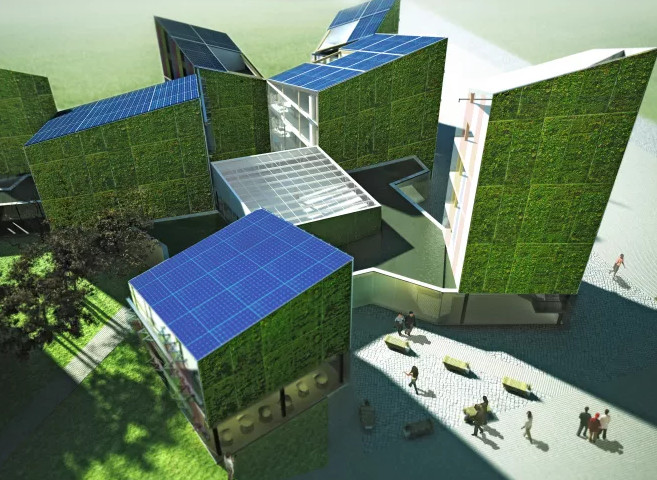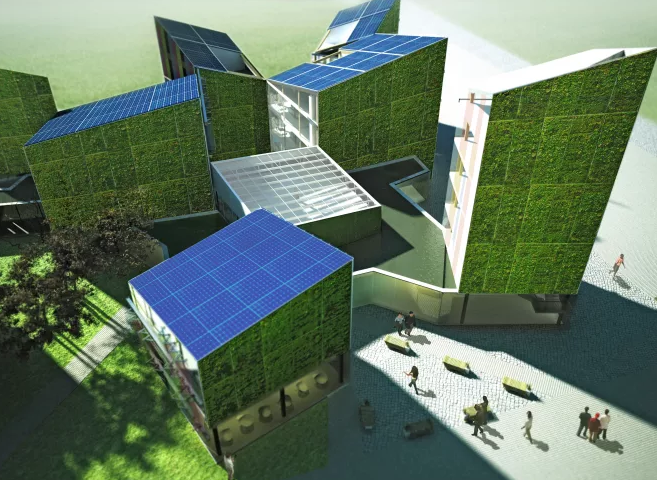
panasonic.co.uk
Electricity for the "smart home" will come from solar panels and hydrogen fuel cells. Heat will be supplied by heat pumps that capture the heat generated by the soil and the air. According to representatives of Panasonic, life in such house will be particularly convenient for the elderly, because they would get a lot of support and independence. For example, the apartments will have screens to display reminders of important matters, consumer electronics itself will control stocks of consumables, a smart refrigerator will monitor availability of food, and order delivery from nearest groceries.
Special equipment will allow the "smart home" to monitor health of the residents, control body temperature and heart rate. In case of any problems, the computer can even call a doctor. The Japanese company is planning to start construction next spring in the administrative district of Adlershof, which is a scientific and technological center of Berlin and residence of Humboldt University. The first tenants will be able to move in the apartments in the summer of 2018.
Panasonic already has experience in development of smart homes in the city of Fujisawa near Tokyo. The territory of 1000 houses was planned according to a single architectural plan in the form of concentric circles. The area’s official opening was held in 2014. The project is called Fujisawa Sustainable Smart Town, and presents a model of smart city, says the developer.
All the houses and infrastructure of the area are controlled by smart networks. The project is meant to reduce water consumption by 30%, and level of air pollution – by 70%.
In December 2014, authorities of American Denver gave Panasonic a plot of land of 160 hectares near the Denver International Airport. Peña Station project is a future business and residential district at the last station of LRT route from Denver International Airport. Unlike Fujisawa, Peña Station district will be more geared for business, that is, commercial buildings here will be interspersed with residential. Panasonic has already built its office here. The area will have approximately 300 office spaces, and a complex of 219 apartments, a hotel and several restaurants.
Solar power plant of 1.3 MW will provide Peña Station with power. The local grid is equipped with capacious batteries, which will accumulate power surpluses.
High-speed Internet, information booths at every turn, intelligent street lighting system, smart parking, and rental station autonomous electric - all of these must-haves of any Smart City will complement the barren landscape of Denver suburbs.
source: ft.com
Special equipment will allow the "smart home" to monitor health of the residents, control body temperature and heart rate. In case of any problems, the computer can even call a doctor. The Japanese company is planning to start construction next spring in the administrative district of Adlershof, which is a scientific and technological center of Berlin and residence of Humboldt University. The first tenants will be able to move in the apartments in the summer of 2018.
Panasonic already has experience in development of smart homes in the city of Fujisawa near Tokyo. The territory of 1000 houses was planned according to a single architectural plan in the form of concentric circles. The area’s official opening was held in 2014. The project is called Fujisawa Sustainable Smart Town, and presents a model of smart city, says the developer.
All the houses and infrastructure of the area are controlled by smart networks. The project is meant to reduce water consumption by 30%, and level of air pollution – by 70%.
In December 2014, authorities of American Denver gave Panasonic a plot of land of 160 hectares near the Denver International Airport. Peña Station project is a future business and residential district at the last station of LRT route from Denver International Airport. Unlike Fujisawa, Peña Station district will be more geared for business, that is, commercial buildings here will be interspersed with residential. Panasonic has already built its office here. The area will have approximately 300 office spaces, and a complex of 219 apartments, a hotel and several restaurants.
Solar power plant of 1.3 MW will provide Peña Station with power. The local grid is equipped with capacious batteries, which will accumulate power surpluses.
High-speed Internet, information booths at every turn, intelligent street lighting system, smart parking, and rental station autonomous electric - all of these must-haves of any Smart City will complement the barren landscape of Denver suburbs.
source: ft.com


















